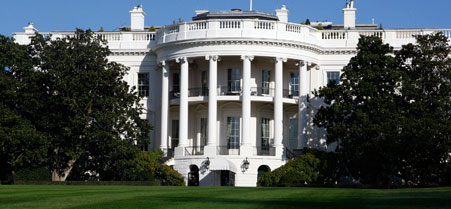White House unveils 'Privacy Bill of Rights'
The Obama administration will unveil a privacy "bill of rights" on Thursday that it says will give consumers more control over how their personal data is collected and used online.
 Ron Edmonds/AP
Ron Edmonds/AP
The Obama administration will unveil a privacy "bill of rights" on Thursday that it says will give consumers more control over how their personal data is collected and used online.
The proposal is included in the Commerce Department's long-awaited privacy report outlining the administration's approach to protecting online information. The White House wants Congress to implement the seven principles outlined in its privacy bill of rights through legislation but also will be working with industry on voluntary steps to help people better manage their personal data online.
"For businesses to succeed online, consumers must feel secure," President Obama said in a statement. "By following this blueprint, companies, consumer advocates and policymakers can help protect consumers and ensure the Internet remains a platform for innovation and economic growth."
Concern over online privacy has grown as more companies track and collect information about people as they surf the Internet, engage on social media or send data on smart phones. While most of the data collected online is used to personalize ads, privacy advocates worry the information could be used for other purposes and want legislation giving consumers more control over their personal data. Such concerns have been highlighted by Google's privacy troubles. The country's biggest Internet company has come under fire for changes it plans to make to its privacy practices and over reports that the company has bypassed privacy controls in order to track people online.
The principles that make up the administration's proposed privacy bill of rights call for giving consumers:
-- Control over what data is collected about them and how it is used
-- Information about a company's privacy practices
-- Assurances that data will be used as intended and will be properly secured
-- Access to data collected about them and a chance to correct it
-- "Reasonable" limits on how much data is collected and retained
-- Assurances that companies will collect only the data they need and keep it only for as long as necessary.
Lawmakers have held numerous hearings related to consumer privacy in the last year and a handful of comprehensive proposals have been introduced. Despite this, prospects for congressional action this year on the issue appear dim and so the administration said it would implement voluntary moves to get industry to adopt stronger privacy protections on their own.
"We will work with Congress to implement [the principles] through legislation," Commerce Secretary John Bryson said during a briefing Wednesday. "But we're moving forward regardless...This cannot wait."
The administration will begin by convening a series of meetings with Internet industry representatives, consumer advocates, and others to develop sector-specific voluntary codes of conduct based on the proposed privacy bill of rights. While company participation in the codes are voluntary, firms that agree to sign on to them will be subject to enforcement by the Federal Trade Commission.
The administration highlighted the self-regulatory steps being taken by a group of media and advertising companies known as the Digital Advertising Alliance. It has launched an icon program to provide consumers with information about online ads and a chance to opt out of receiving ads based on their personal preferences. The alliance announced on Thursday it was expanding the program and would require its members to honor the requests consumers make about whether they want to be tracked online for advertising purposes. The alliance members include major online firms such as AOL, Google, Yahoo and media companies including Disney and Gannett.
Some Internet browsers such as Microsoft's Internet Explorer and Mozilla's Firefox browser already offer users a so-called "do-not-track" option but not all websites honor consumers' tracking requests. Alliance General Counsel Stu Ingis said Wednesday that his group would be working with browser companies on developing a standardized "do not track" approach in browsers.
FTC Chairman Jon Leibowitz called the alliance's move a "significant step forward" in enhancing consumer privacy online. In its own draft privacy report, the FTC called for giving consumers a do-not-track option. The agency is slated to release its final privacy report in the coming weeks.
NEXT STORY: Meaningful Use, Stage Two





